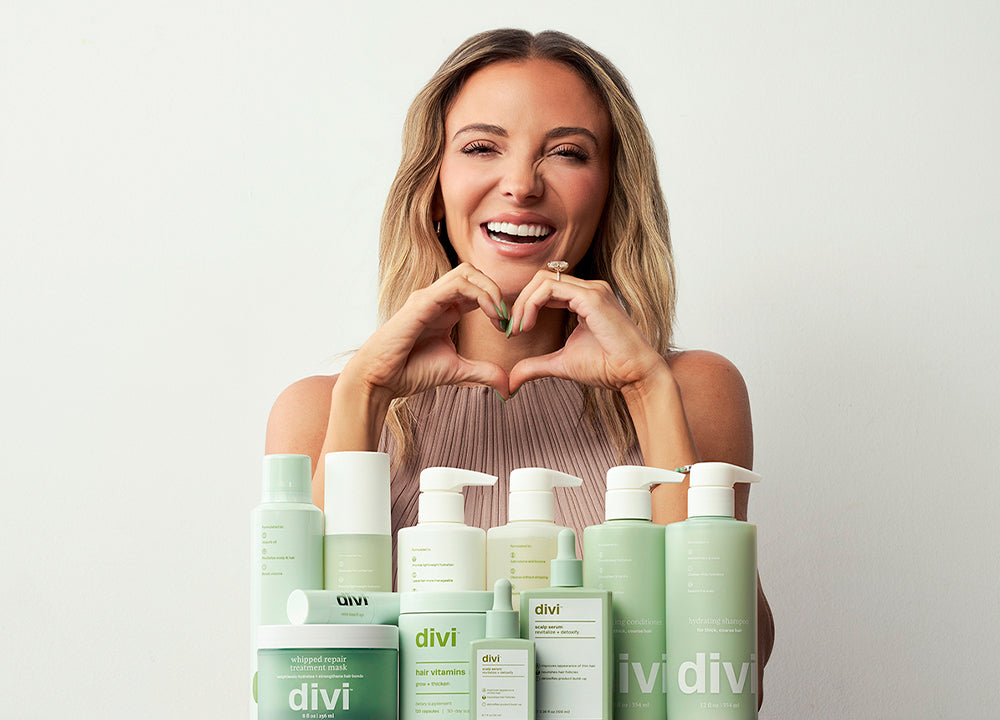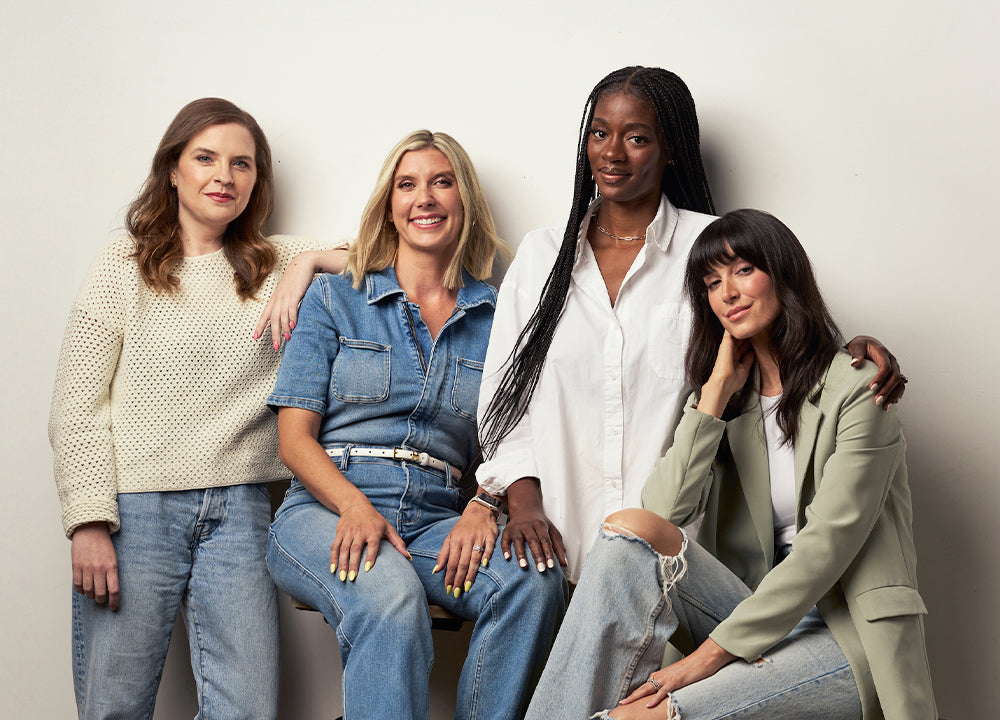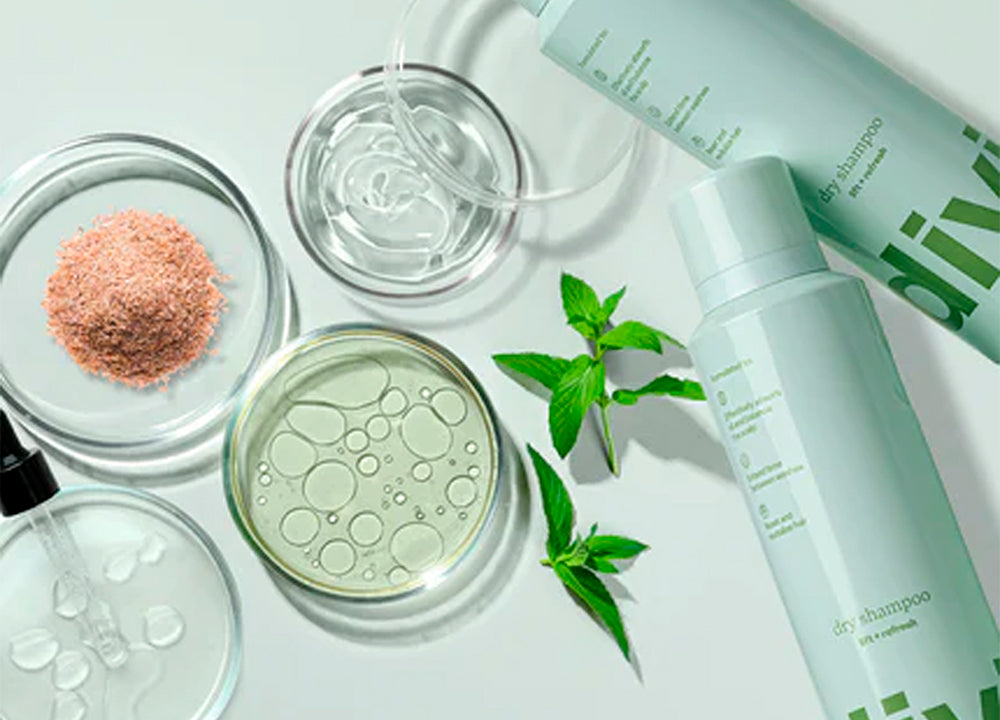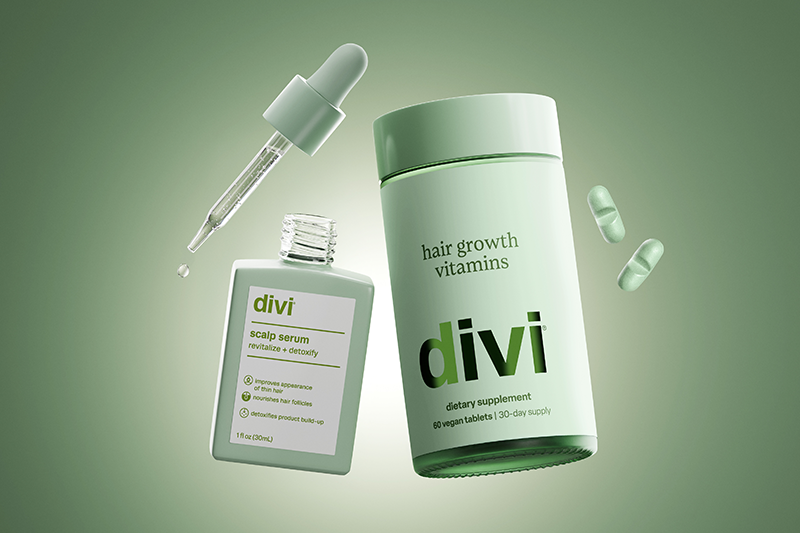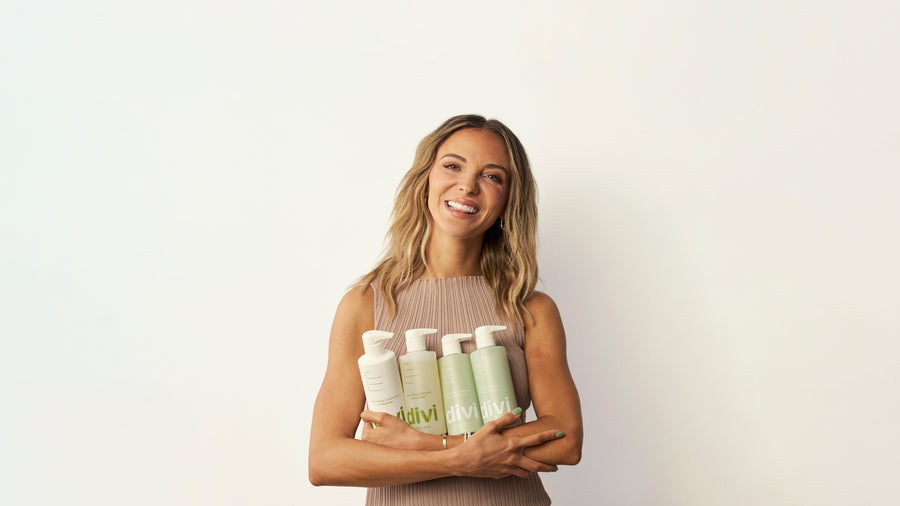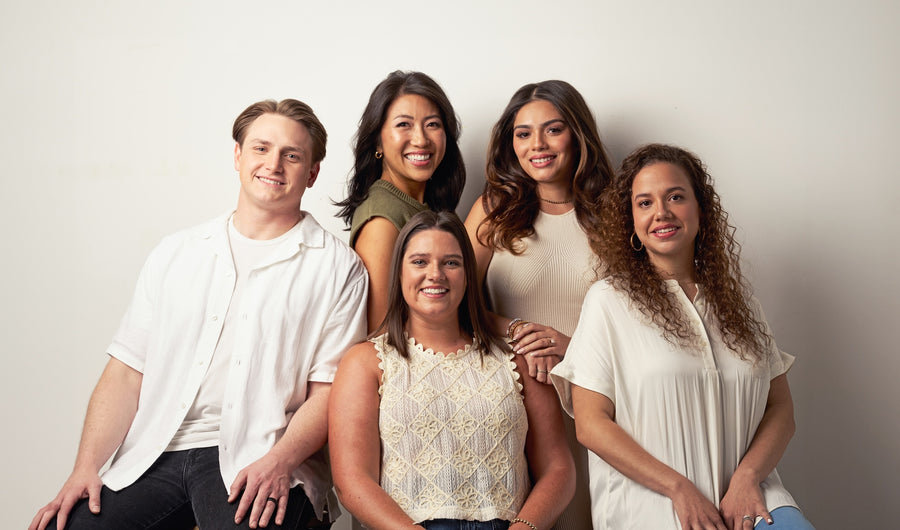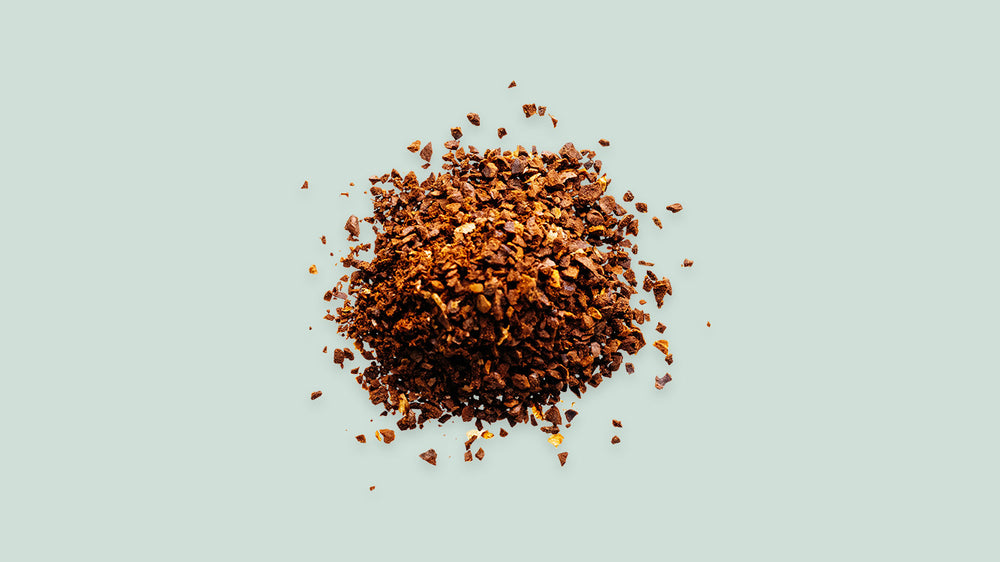Caffeine fuels our bodies in the morning and helps us get through that tricky afternoon slump. Did you know that topical application of caffeine also has another benefit: stimulating hair growth?
Numerous scientific studies show promising results when exploring caffeine’s benefits for treating hair loss. Apparent effects of caffeine on hair health include hair shaft elongation, reduced scalp inflammation, and enhanced hair growth. So how does caffeine influence hair growth, how would you include this component in your hair care routine, and how does the caffeine in Divi’s Scalp Serum further help reverse hair loss?
What Is Caffeine?
Caffeine is a natural chemical that occurs in the leaves, seeds, or fruit of more than 60 plants, most notably coffee beans, tea leaves, kola nuts, and cacao pods. Because caffeine stimulates our brain and central nervous system when we ingest it, drinks and foods containing caffeine (coffee, tea, cola drinks, and chocolates in particular) are popular additions to human diets. Synthetic caffeine produced in labs has also become a frequent artificial additive to some packaged food and drink products.
In terms of chemical processes, caffeine is a methylxanthine alkaloid, structurally related to adenosine. Caffeine binds to adenosine receptors in the central nervous system to inhibit adenosine binding. In doing so, it stimulates the vagal, medullary, respiratory, and vasomotor centers in the brain, resulting in caffeine’s psychotropic effects. Its anti-inflammatory properties relate to the inhibition of phosphodiesterases (PDEs), the effects of which reduce inflammation.
How Is the Topical Application of Caffeine Relevant for Scalp and Hair Health?
Caffeine has been proven to stimulate hair follicle growth, improve follicle penetration, and promote hair growth. It can play a key role in managing androgenetic alopecia, also known as male pattern baldness and female pattern baldness.
In 2007, studies affirmed caffeine’s ability to stimulate hair growth in-vitro by inhibiting PDEs. Caffeine can easily cross the skin barrier and enter local cells. An additional study demonstrated that caffeine can penetrate hair follicles with external application — which means your scalp can absorb caffeine, and caffeine can potentially produce a powerful localized effect. These findings prompted the manufacture of various caffeine-enriched shampoos, rinses, and other products for topical, external use.
The current body of research indicates that topical application of caffeine to the scalp may:
- Suppress DHT (dihydrotestosterone), the infamous hair-loss hormone
- Encourage hair shaft elongation
- Stimulate hair growth
- Promote hair and scalp health
Explaining Caffeine’s Benefits for Treating Hair Loss
So what exactly makes caffeine good for your hair? Caffeine acts through several complex biochemical pathways, and researchers suggest several mechanisms may decipher caffeine’s hair health-promoting effect.
DHT Suppression
DHT, a sex hormone derived from testosterone, disrupts the hair growth cycle by binding to receptors in hair follicles, making follicles shrink and interfering with hair growth. Simultaneously, DHT shortens the hair growth phase and causes follicles to spend more time without producing new hair. The result is a typical baldness pattern that affects men and, to a lesser extent, women with high DHT levels.
An in-vitro study shows that caffeine may act similarly to DHT blockers on hair follicles. Researchers have hypothesized that caffeine achieves this effect by inhibiting phosphodiesterase (PDE), an enzyme that breaks down cAMP (cyclic adenosine monophosphate), an important cellular messenger helping cells mobilize essential nutrients. With less PDE and more cAMP, hair follicles may enjoy faster metabolism and improved cell growth. In the aforementioned study, the caffeine-treated hair follicles showed increased hair shaft elongation after 120 hours for the study group compared to the control group.
Hair Elongation
In 2014, another study attempted to measure the effect of caffeine on hair shaft elongation. The researchers observed male and female hair follicles in-vitro, evaluating factors like the transition from the anagen (active growth) to catagen (regression) phases during the hair growth cycle, keratinocyte production, and several growth factors.
The researchers concluded that the caffeine-treated follicle group showed a significantly longer anagen phase and higher keratinocyte proliferation. In other words, caffeine promoted both more extensive hair growth and healthier hair structure.
Interestingly, while both male and female hair follicles showed receptivity to caffeine in this study, female hair follicles exhibited a stronger response to caffeine treatment.
An Antioxidant Effect
Caffeine, as well as its derivatives xanthine and theobromine, is a powerful antioxidant that may counteract harmful free radicals and suppress oxidative DNA breakage. Thus, topical caffeine applications may be especially beneficial for people with damaged hair who experience high levels of oxidative stress.
Antioxidants may help improve the texture of dry, brittle, and dull hair, make frizzy hair smoother, and easier to handle, and boost hair shaft regeneration.
Improving Blood Circulation
Caffeine is a well-known vasodilator. It causes blood vessels to widen, boosts blood flow, and improves circulation. Applied topically to the scalp may translate to more efficient local blood circulation and more essential nutrients flowing toward the hair follicles. The effect is short-lived, which is why the efficacy of any caffeine-containing product relies on daily application.
Protection from UV Radiation
Few people are lucky enough to escape the summer without some sort of UV radiation damage to their hair. Prolonged sun exposure can cause hair to become dry, rough, and brittle, break more easily, and lose its luster. A 2019 study suggests that topical caffeine application may protect hair follicles from UV radiation and help regenerate sun-damaged hair.
In the study, caffeine application three days before and after exposure to UV radiation offered protection against UV-induced hair follicle damage and keratinocyte death. These results are highly promising for people who live in sunny climates and sustain a lot of UV-induced hair damage during summer seasons.
Why Do Men and Women Lose Hair?
Both men and women can suffer from hair loss, although hair thinning and loss appears both earlier and more extensively in males. Male pattern baldness with a typical receding hairline starts affecting many men from a very young age (even in teenage years). More than half of men ages 50 and up suffer from some degree of hair loss.
In women, the female version of androgenetic alopecia typically appears after menopause and involves overall hair thinning. Younger women who experience hair loss often suffer from some type of hormonal imbalance because of PCOS (polycystic ovary syndrome) or other conditions. Hair loss during pregnancy and after childbirth is also common.
Additionally, hair loss may occur in both sexes because of:
- Sudden, poorly controlled weight loss
- Nutrient deficiencies
- Oxidative stress
- Environmental factors
- Thyroid dysfunction
- Some autoimmune conditions (psoriasis, lupus, Hashimoto’s disease, and more)
- Certain drugs, like acne medications, antidepressants, and steroids
For many people, hair loss causes intense self-esteem issues. However, conventional medicine offers limited options for hair loss treatment, apart from surgical solutions like hair implantations and hair loss medications that may cause side effects. For this reason, many people are looking for clean, plant-derived solutions to help them restore hair health. Divi’s Scalp Serum provides a satisfying solution.
How Effective Is Caffeine for Treating Hair Loss?
A study of women suffering from telogen effluvium, a common trauma-related scalp disorder that causes hair shedding, suggests that caffeine shampoo can improve hair strength, reduce shedding, and protect against hair loss. Women who suffered from androgenetic alopecia also experienced the beneficial effects of caffeine-containing shampoo, including reduced hair loss and improved hair strength, after six months of use.
Can the effect of topical caffeine compare to prescription drugs? A study examining the effect of a caffeine-based application on male baldness shows that the caffeine product was no less effective than Minoxidil — with the additional advantage of being a safe, food-grade ingredient that didn’t expose users to the potential side effects of scalp irritation and inflammation.
Is It Safe To Use Caffeine on Hair?
Using caffeine as a topical application as part of a well-researched formula such as Divi’s Scalp Serum is safe and has no known side effects.
Is It Suitable for Vegans?
All of the ingredients in Divi’s Scalp Serum, including caffeine, are vegan-friendly.
Is There Such a Thing as Too Much Caffeine for Hair?
Despite the numerous beneficial effects of caffeine on hair and scalp health, it’s important to provide the optimal dose of caffeine for your hair. Just as having too many double-shot espressos can cause headaches and irritability, using excessive caffeine concentrations on hair follicles may harm hair growth. Too much caffeine may overstimulate follicle metabolism, lead to excessive nutrient consumption, exhaust keratinocyte proliferation, and inhibit hair shaft elongation.
That’s why using a carefully researched hair and scalp care product like Divi’s Scalp Serum, containing calculated and safe proportions of each ingredient, is the healthiest option for your skin and hair.
How to Use Caffeine for Maximum Hair Health Effect
By now, it’s clear that caffeine’s claims to have beneficial effects on hair health have a solid scientific basis. How does this translate to practical application? What can you expect when you start using a topical caffeine-containing product like Divi’s Scalp Serum on your hair and scalp?
When you include caffeine in your hair treatment, you should:
- Expect variation. Different people react differently to caffeine-containing hair products. The effect of caffeine on your hair and scalp may depend on various factors, like the length of your natural hair growth cycle, nutrition, environmental conditions, age, and more.
- Use the product regularly. You may need to wait a few weeks for the full effect of a product such as Divi’s Scalp Serum to kick in. Regular application is a crucial part of every successful hair care routine.
- Don’t overuse. To make the most of your caffeine-containing application, follow instructions as to the amount and frequency of use.
The Synergistic Benefits of Caffeine and Other Ingredients in Divi’s Scalp Serum
While caffeine offers potent benefits for promoting hair growth, caffeine alone may not achieve the holistic scalp health solution most people aim for. Divi’s Scalp Serum formula maximizes caffeine benefits for treating hair loss by combining caffeine with other clean, nourishing ingredients like:
- Copper Tripeptide-1 (GHK-Cu)
- Hyaluronic acid
- Essential amino acids (glycine, arginine, threonine, and serine)
- Vitamin C
- Tea tree oil
- Peppermint oil
- Menthol
- Eucalyptus oil
- Green tea leaf extract
- Rosemary leaf extract
Together with just the right amount of caffeine, Divi’s Scalp Serum combination of perfectly balanced ingredients can soothe and invigorate the scalp, providing moisture without greasiness and vitality without pesky side effects. Users have found that regular application of Divi’s Scalp Serum helps them achieve healthier, thicker, faster-growing hair with an improved texture.
Using Divi’s Scalp Serum
It’s simple and easy to include Divi’s Scalp Serum in your hair care regimen. Use our Scalp Serum once a day, in the morning or before sleep.
To apply the serum:
- Thoroughly shake the bottle
- Apply ¾ of a dropper to a dry or towel-dried scalp
- Massage Divi’s Scalp Serum into your scalp
- For full effect, leave our Scalp Serum on your scalp overnight or throughout the day (some light tingling is normal and doesn’t indicate sensitivity to the product)
Remember that while Divi’s Scalp Serum contains powerful ingredients that may promote hair health, the product doesn’t aim to cure underlying issues like scalp conditions, hormonal imbalances, or nutrient-absorption problems that may cause hair loss. If you experience severe hair loss with no obvious reason, please talk to your health care provider and get an accurate diagnosis as soon as possible.
Promote Optimal Hair Health By Using Divi’s Hair and Scalp Products
At Divi, our research scientists develop our Scalp Serum and other hair products with clean, science-backed ingredients. Divi’s Scalp Serum combines caffeine benefits for treating hair loss with other powerful components that enhance hair and scalp health.
When you choose Divi, you’ll know you’re using a vegan-friendly, scientifically backed, dermatologically tested hair product made in the United States.
Are you ready to let your hair enjoy the Divi effect? Order your first batch of Divi’s Scalp Serum today.




























